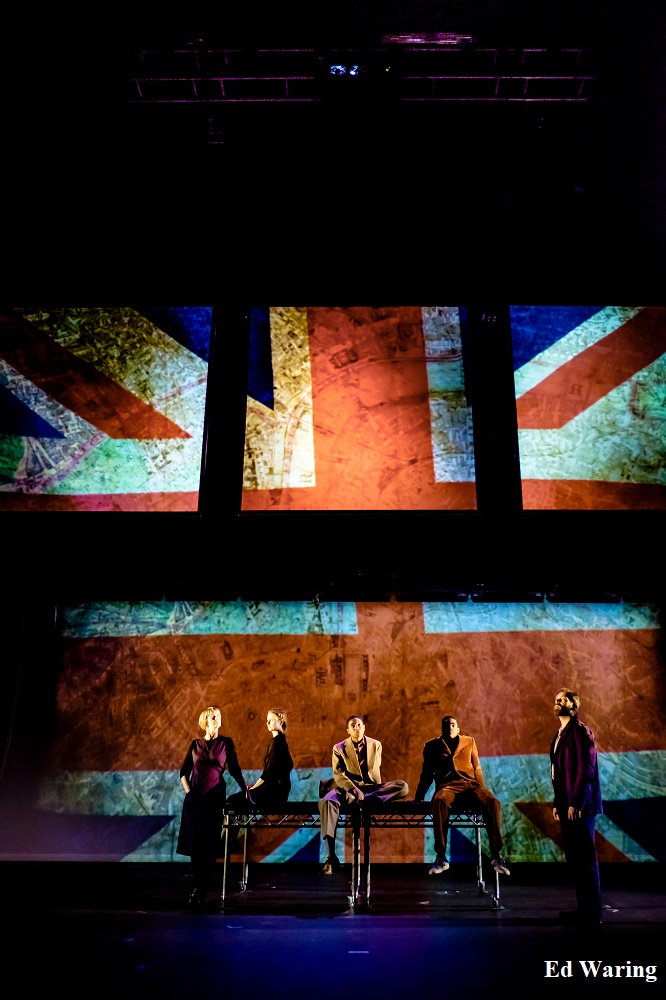No-one could ever accuse imitating the dog of lacking artistic bottle but they are really going for this time taking on Joseph Conrad’s classic Heart of Darkness.
In the novel Conrad’s protagonist Marlow takes a grim and hallucinatory trip up the Congo River searching for mythical ivory trader Kurtz, and witnessing the misery caused by the brutal European colonial powers. Imitating the dog co-founders Pete Brooks and Andrew Quick are fans of the book, but have adapted it for our troubled times in much the same way Francis Ford Coppola did with Apocalypse Now.
“We started the adaptation with the sense that it was important and had crucial things to say not only about the late nineteen century and early twentieth century, but maybe about what is going on now,” says Andrew. “We did feel that were some problems in staging the novel and the most obvious is that Conrad’s main character Marlow observes the world that he goes through, but doesn’t really give that world any voice. In the 21st century that would be quite difficult to translate onstage.”
So with that in mind the creative team have kept all the key elements of the novel, but they have almost totally flipped Marlow’s journey, and reinvented the person taking on the search for Kurtz.
“We started off thinking if might re-orientate the novel, and where might we do that? We immediately went back to a landscape that haunted our work a lot to a place where the journey might take place, which would be a war torn Europe. That is a version of history where the Second World War doesn’t end and continues on into the 1940s, and maybe into the 1950s.”
“European nation states don’t really exist anymore, so then we had the idea that maybe our Marlow comes from Africa, and is journeying through this destroyed Europe. So the river becomes the Autobahn system across Europe, they go on a boat up the Thames and meet our Kurtz on the ruined lawns of Greenwich.
“That immediately starts to make parallels to the original novel, then we thought it wasn’t just a black person from Africa, but it was also a woman, so what does that bring to the story?”
So the classic question for any company adapting a novel written a century ago at the zenith of European nations as colonial superpowers is how will it be in any way relevant to a savvy modern audience?
“It reveals a lot as one part of the novel is about what happens when human greed and an amoral notion of trading and consumption is let loose without any framework of responsibility,” notes Quick. “I think some of the narratives going round now about not just Britain’s future, but other countries, seem to be replaying myths about empire and commonwealth.
“I think that is good to return to the actual stories that were told during that period, but also reforming them for now they can be very potent and resonate for us. We keep the events in the novel very similar, so if you know the novel you can enjoy the adaptation, and if you don’t then you can just enjoy the story for what it is.”
One of the criticisms of Conrad, with the benefit of a century of hindsight, is that there is unconscious racism in his work which imitating the dog are well aware of. In fact so much so that they have brought the debate that informed their thinking about how to tackle that significant problem to the stage.
“One of the other narratives traced right the way through the work is we stage a kind of rehearsal process of discussion where the adaptation itself is talked about In that we debate, in a hopefully humorous and entertaining way, these issues around can we do a novel where all the white people have all the language, and all the black people are seen and objectified in a particular way. If we change it to a woman what does that mean and we bring in other adaptations like Apocalypse Now which inform our version.”
“What was amazing about the novel is how it predicted some of the terrible things of the 20th century under the name of empire one way or another.”
As well as intellectual rigour imitating the dog always bring a rich visual palate to the stage. Another founder member Simon Wainwright is creating the projection and video design which will fuse live performance and the latest digital technology.
“We have a live green screen so the performers onstage are filmed, but in real time that is translated into these very beautiful images. It is very cinematic, and quite like a graphic novel with a rolling soundtrack. It cuts between bits of documentary material, it’s quite jagged, moves around but continually tells this story.”
Given Britain is only a matter of days from leaving the EU despite the very real prospect of a No Deal this tour could hardly have been more timely.
“The referendum had happened when we were thinking about doing this, so we thought there is something in this novel that might really be resonant, but I don’t think we fully knew that as we would stage it in the UK that it would coincide with our leaving the EU. With that massive change in our identity people are only now releasing what it means to leave, and now everyone is thinking what will the future bring?”
TOUR DATES:
5th – 6th March - Cast, Doncaster
19th – 23rd March - The Dukes Lancaster
26th – 30th March - Theatre by The Lake, Keswick
2nd – 3rd April - Northern Stage, Newcastle
9th – 10th April - York Theatre Royal
16th – 18th April - Lowry, Salford Quays
1st – 4th May - Liverpool Playhouse

